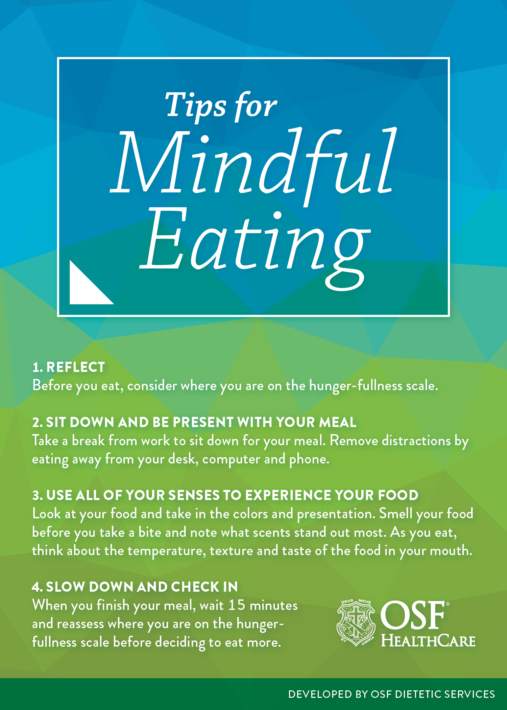
Tune in during meals to prevent overeating
Distractions. They’re all around us.
Whether it’s a ringing cellphone, incoming emails, a fussy child, a demanding teenager, breaking news on the TV – distractions can keep us from focusing on the things that need our full attention.
Like eating.
Over the past year during her dietetic internship with OSF HealthCare Saint Francis Medical Center in Peoria, Illinois, Alex Nguyen, has worked on a project centered on “mindful eating.”
“Mindful eating is the practice of tuning in while you are eating and being more present and aware of the meal you are having,” Alex said. “A lot of people tend to rush when eating their meals, or they eat with lots of distractions. This can lead to overeating and not feeling good about the meal you just had.”
Not only that, putting aside the distractions also allows you to connect with others around you, whether you’re having lunch with co-workers at work or having dinner with your family at home.
“By using the techniques associated with mindful eating, you can learn how to tune in more with your meal and how to know if you are eating the right amount to satisfy your hunger without overdoing it,” Alex said.
The mindful eating techniques can be helpful in combating daily stress and burnout. Alex shares more about those techniques:
Reflect
Before eating, consider where you are on the hunger-fullness scale.
“This can help you determine if you are truly hungry at this time. If you do not actually feel hungry, why else might you be eating? If you are eating due to feeling stressed, sad, or bored, there could be other ways to help you deal with those emotions besides food,” she said. “But if you truly feel hungry, then it is the perfect time to have a meal or snack.”
Sit down and be present with your meal
Take a break from work to sit down for your meal. Remove distractions by eating away from your desk, computer and phone.
“Being present with your meal helps you better know how you are feeling during the meal,” Alex said. “If you are paying attention to your phone or the TV instead of your meal, you may completely miss out on the sight or taste of the food you are eating. If we put away distractions, we can potentially enjoy our meal more than we usually do.”
Use all of your senses to experience your food
 Look at your food and take in the colors and presentation, Alex suggested.
Look at your food and take in the colors and presentation, Alex suggested.
“Smell your food before you take a bite and note what scents stand out most. As you eat, think about the temperature, texture and taste of the food in your mouth,” she said. “Tuning in to your senses while you eat will help you take your time with eating and not overeat as easily. As you eat your food, take your time to really think about the taste, what flavors stand out, and how you are enjoying your food. By doing this, you’ll think about your food in a way that you may not have before, and potentially enjoy it more because of this process.”
Slow down and check in
Need a recipe?
When you finish your meal, wait 15 minutes and reassess where you are on the hunger-fullness scale before deciding to eat more.
“This is an important step. The hunger-fullness scale consists of a scale ranging from 1 (ravenous) to 10 (painfully full/sick),” Alex said.
It is typically best to eat when you are between a 3 (hungry, stomach may be growling) to 7 (full, satisfied). After you have eaten, check in and determine where you fall on the scale. If you aren’t at a 7 yet, then go ahead and have some more. If you are at a 7, or higher, it is best to stop eating for a bit until you are back down to a 3 or 4.
“By checking in with this scale and how you are feeling after eating, you can determine if eating more is necessary (because you are still hungry) or if it is not (because you are already full and may feel too full or sick if you ate more),” she said.
No one is perfect

One thing to remember, there is no such thing as perfect eating. Being mindful of your eating is about being aware and is not about criticism or judgment.
“Even if you try to follow these techniques, you may find yourself in situations where you just want to eat more than you feel you should or that your body is telling you,” Alex said. “Don’t get too down on yourself if you have dinner while watching TV sometimes or eat past a 7 on the hunger-fullness scale because you are out with friends and want to eat more.
“Always remember to just enjoy the food you are having in the moment you are having it,” she said. “Over time you’ll become more in tune with your body and what it needs from the food you are providing it.”
Healthy recipes
Need something new to serve for breakfast, lunch or dinner? Check out the recipes created and analyzed by OSF HealthCare dietitians.
Most of the recipes are gluten free or can be made gluten free. Recipes that are gluten free are labeled.
About the Dietetic Internship
The Dietetic Internship program at OSF HealthCare Saint Francis Medical Center is a 52-week supervised program. It provides stimulating and challenging learning opportunities for the dietetic college graduate.
Once accepted, participants become a part of a high-performance health care team and develop leadership skills necessary for a career in dietetics. Upon satisfactory completion of the program, the intern will be a competent entry-level dietitian, eligible to apply for active membership in the Academy of Nutrition and Dietetics, and take the Registered Examination for licensure as a Registered Dietitian.
The program currently has accreditation status with the Accreditation Council for Education in Nutrition and Dietetics (ACEND) of the Academy of Nutrition and Dietetics.
